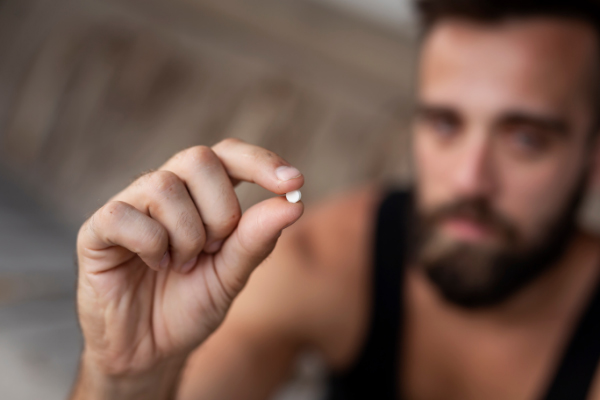The drug Ecstasy contains MDMA, which stands for MethyleneDioxyMethAmphetamine. Ecstasy is a synthetic (lab-created) drug. It is a Schedule 1 drug under the Controlled Substances Act and means that it has a high potential for abuse and zero medical uses. Ecstasy is considered a hallucinogenic and stimulant. Ecstasy is addictive and can cause accidental overdose and death. People who take ecstasy report having increased sensory responses to touch, lights, sound and increased self-awareness, empathy, or enjoyment. Ecstasy is also a club drug with other hallucinogenic stimulants such as Molly, Ketamine, and LSD.
Where Does Ecstasy Come From?
Historically, MDMA as Ecstasy was formulated initially as a psychiatric medication. But before Ecstasy, in the early 1900s, German scientists developed MDMA to control bleeding. Then, in the 1960s, the psychiatric community in the United States started using MDMA during therapy sessions and was hopeful about the effects. However, in the late 1970s, the DEA reported batches of MDMA on the street and passed into law, making it an illegal drug. Today, drug cartels and underground club drug producers make Ecstasy in giant quantities to be sold on the street. Ecstasy use and addiction are especially hazardous due to drug dealers mixing Fentanyl with most illegal drugs. In 2020, 2.6 percent of people aged 12 or older (or 7.1 million people) used hallucinogens, such as Ecstasy, in the past year. (SAMHSA)
Is it Addicting?
The research on why Ecstasy is as addictive as other drugs have to do with the reward center in the brain and how a person reacts to dopamine. It is also an issue why anyone can get addicted to any type of drug. Addiction to Ecstasy or any other substance is a disease of the mind and emotions. Most people who use Ecstasy are out to have fun and enjoy the nightclub or party. However, if someone is predisposed to addiction, they will no longer enjoy the event unless they are on Ecstasy. The brain’s reward center allows someone to experience pleasure and feel good. People who abuse Ecstasy essentially drain the reward center and feel less joy.
What Do Addiction Experts Say About Ecstasy?
The National Institute on Drug Abuse explains what Ecstasy does to the brain, why it is addicting, and why people get addicted to Ecstasy.
MDMA (Ecstasy) increases the activity of three brain chemicals: Dopamine—which produces increased energy/activity and acts in the reward system to reinforce behaviors. And Norepinephrine increases heart rate and blood pressure, which are particularly risky for people with heart and blood vessel problems. Serotonin—which affects mood, appetite, sleep, and other functions. It also triggers hormones that affect sexual arousal and trust. The release of large amounts of serotonin likely causes the emotional closeness, elevated mood, and empathy felt by those who use MDMA. (NIDA)
How to Identify Addiction to Ecstasy?
Someone may not have apparent indications that their ecstasy use is problematic as this drug is most often only used at clubs and parties. Still, some signals will indicate a problem with MDMA. A person who has developed an addiction to ecstasy will:
- Increase the frequency and amount of Ecstasy they use
- Focus on having Ecstasy most of the time
- Have problems at work, school, or college
- Spend days recovering from using Ecstasy
- Experience difficulties with memory and cognitive function
- Struggle to socialize or form close relationships unless using Ecstasy
- Experience financial difficulties due to Ecstasy buying or unplanned spending while high
- Continue to take Ecstasy despite problems with health, work, school, or family
Help is One Call Away at Evoke Wellness in Massachusetts
Evoke Wellness in Massachusetts has been helping people who use Ecstasy addictively or in excess. We have a program for young adults, men, and women that provide in-depth therapy and one-on-one counseling. Counseling and treatment programs for Ecstasy addiction begin with evidence-based treatments that provide safe and effective medication to help you. Do not let an accidental overdose or your life ruin the drug Ecstasy. Finally, we have the answer on how to enjoy life without Ecstasy. Call now to start.




